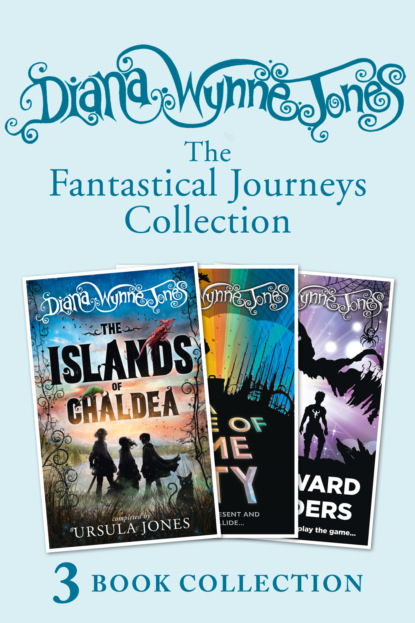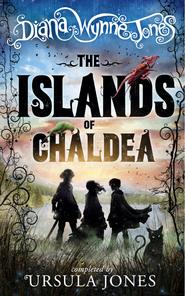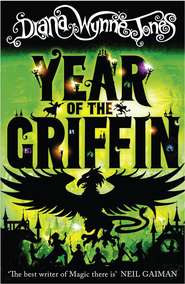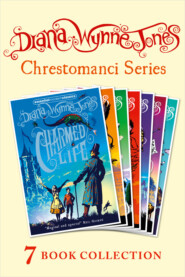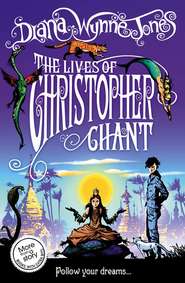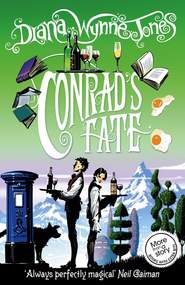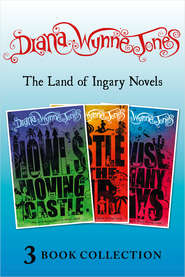По всем вопросам обращайтесь на: info@litportal.ru
(©) 2003-2024.
✖
Diana Wynne Jones’s Fantastical Journeys Collection
Настройки чтения
Размер шрифта
Высота строк
Поля
When the piping and the grating of chairs and benches had stopped, King Farlane was standing behind the special tall carved chair left empty for him.
“We are called here on a matter of justice,” he said. “This must be settled before we can go any further. We invoke the favours of all high gods and lesser spirits and thereby open this hearing. Will Kinnock, Priest of Kilcannon, please state his case?”
“I certainly will,” the Priest said grimly. “I accuse Donal, Prince of Conroy and Kilcannon, of robbery, arson and murder.”
“Denied,” Donal said calmly, and he turned his arm around to admire the bracelets on it, as if he were a little bored by the matter.
“Denied?” snarled the Priest. His black eyes glared from under his great tufts of black eyebrow. “Do you stand there and have the gall to deny that, two nights ago, you and your band of ruffians rode up to Kilcannon and set fire to my house?”
Quite a number of people gasped at this, including Ivar. He turned to Donal, glowing with surprise and delight. Ivar shows a regrettable tendency to admire his elder brother. And a childish one. After the first glow, Ivar’s face went dark and peevish. I heard him mutter, “Why didn’t you let me come too?”
“Answer me!” thundered the Priest. “Before I bring down the curse of the gods upon you!”
Donal continued to turn bracelets around on his arm. “Oh, I don’t deny that,” he said casually. “It’s the charge of robbery and murder I take exception to. Who died?”
“Do you deny you went off with all my sheep? Where are my goats and oxen, you bandit?” raved the Priest. He was shaking with anger so that his fine robe rippled.
“The animals?” said Donal. He shrugged – which made the Priest madder than ever. “We simply drove them off. You’ll find them wandering the hills somewhere if you care to go and look.”
“You – you – you—!” stuttered the Priest.
“I repeat,” Donal said, “who died?”
“A fair question,” King Farlane put in. “Was anyone killed?”
The Priest looked as if he had bitten on a peppercorn. “Why, no,” he admitted. “I was out with my novices rehearsing for the full moon.”
“Then there is no charge of murder to meet,” King Farlane pointed out. “And it seems that there was no robbery either. There is only the charge of burning not denied. Prince Donal, what reason had you for burning this man’s house?”
“Reason, sire?” Donal said blandly. “Why, I thought the Priest was inside it of course. It is a great disappointment to me to see the wretch strutting in here alive and snarling.”
I thought the Priest was going to dance with rage at this. If I had liked Donal more, I would have cheered.
“Sire,” said the Priest, “this barefaced wickedness—”
“I object,” said Donal, “to being accused of wickedness. What has religion got to do with right and wrong?”
“You snivelling sinner!” thundered the Priest. “Religion has everything to do with right and wrong! Let me tell you, Prince, your heathen ways will bring this fair island of Skarr to her knees if—”
“And what have my morals to do with politics?” snapped Donal. “What a man does is his own to do, and no concern of the gods or the kingdom.”
“This,” shouted the Priest, “is the speech of one who has wilfully taken evil to be his good. I denounce you before the High King, your father and all these witnesses!”
By this time, King Kenig – not to speak of most of us standing at the tables – was looking extremely uncomfortable and making little movements as if he wanted to intervene. But the High King stood there, turning his tired, kindly eyes from the Priest’s face to Donal’s, until the Priest raised both his bony arms and seemed to be going to call curses down on the castle.
“Enough,” King Farlane said. “Prince Donal, you are baiting this man. Priest, what damage has the fire done to your house?”
The Priest shuddered to a halt and took his arms down. “Not as much as this evil young man hoped,” he said slowly. “It is built of solid stone, roof and all. But the door and window frames, being wood, are mostly burnt.”
“And what of the inside?” the High King asked gravely.
“Luckily,” said the Priest, “the roof sprang a leak in the rain and most of it was wet inside. This godless animal threw a brand inside, but it simply charred the floor.”
“So what cost would you estimate for repairs?” the High King continued.
“Six ounces of gold,” the Priest said promptly. Everyone gasped. “Including the leaking roof,” he added.
King Farlane turned to Donal. “Pay him that amount, Prince.”
“I protest, sire,” said Donal. “He has gold enough off us in temple dues. A more grasping person—”
“Pay him,” repeated the King, “and the matter will be thereby settled for good.”
“Sire.” Donal bowed his head dulcetly and stripped off one of his many bracelets, which he handed to the person next to him at the table. As the bracelet went flashing from hand to hand towards the Priest, Donal said, pretending to be anxious, “Pray have it weighed, Priest. It may be nearer seven ounces.”
“No need,” said the High King. “The case is concluded.”
The Priest received the bracelet, glowering, and it seemed we could all sit down to eat then. But I doubt if the Priest enjoyed his dinner much. He looked sour enough to turn milk.
“Hm,” said Aunt Beck. “Hm.” She took a small rye loaf off a towering basket of them and pushed the basket on to me. “That was all very nicely staged, wasn’t it?”
“What do you mean?” I whispered. “Donal and the Priest hate one another, everyone knows that.”
“True, but there had to be a glaring reason, I guess, for the High King to come here,” my aunt observed. “There will be a private reason too. As we have been specially summoned, we may well discover what it is before long.”
“Are you sure?” I asked.
“I have in mind,” my aunt mused, tearing her loaf apart and reaching for the butter, “two things. First, that our cousin Donal, while addicted to jewellery, seldom wears quite so many bracelets. That man can scarcely lift his arms. And second that I have never known our cousin the King trust Ogo with a message before. Planning lies behind both these things. You’ll see.”
Blow me down, she was right! We had scarcely finished a splendid dinner, entirely without porridge, to my great joy, and the two kings had scarcely risen and withdrawn to some private place, when Donal passed casually along behind our chairs. He was indeed holding his arms rather straight down by his sides. “Ivar,” he murmured to his brother, “you and Beck and Aileen follow me, will you?”
We followed, across the platform and out by one of the doors at the back of it. There Donal led us on a corkscrew path through private corridors I did not know, and finally up a curving flight of stairs to a heavy door.
“I have given out that Beck and Aileen have gone home,” he remarked over his shoulder as he rapped on the door.
“And why, pray?” murmured my aunt, not as if she expected an answer. I think she was just giving voice to her annoyance that Donal should so coolly organise her movements. Our family is used to coming and going as it pleases.
The door was opened by one of the robed attendants of the High King, who stood back and ushered us inside without a word. The room beyond was one I had never seen before with great windows that, but for the fog, would have given a wide view southwards over the sea. As it was, the fog was thinning and giving way to a red sunset, making the light quite confusing, since the room was lit with a tall lamp and many candles.
The High King was sitting with King Kenig on his right and Queen Mevenne on his left. Two more attendants stood in the background, but I scarcely looked at them. The other people in the room were the old Dominie and the Priest of Kilcannon. My heart began to thunder in my ears as I realised that great doings must be afoot, to cause Donal and the Priest to come together in the same small room.
(#ulink_7d0ccfbd-740e-52fd-84f0-1cdf45ba130b)
Ivar was as astonished as I was. “What’s going on?” he demanded, making a hasty bow to the two kings.
“Please take a seat,” said the High King, “and we shall tell you.”
King Farlane was not a well man, I saw, as we sat on the low padded stools put ready in front of him. He was huddled in a royal plaid above his scarlet robes and someone had put a brazier near him for further warmth. But it was his face that showed his illness most. It was white, with a yellowish tinge, and the skin of it was very tight to the bones. What spare flesh there was had drawn into deep wrinkles of pain. But his tired eyes were not subdued by his disease. They gazed at us with a shrewdness and sanity which were almost startling.





